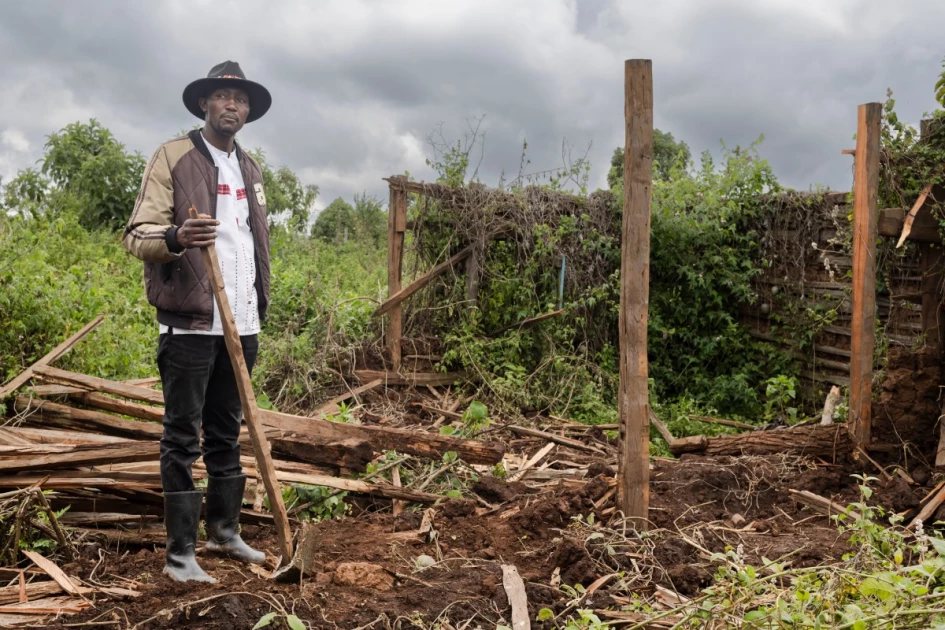Evicted from their forests, Narok hunter-gatherers fight for their rights

Fred Ngusilo's grandfather's home was destroyed in Kenya's Mau Forest © Tony KARUMBA / AFP

Audio By Carbonatix
Fred Ngusilo stoops to pick up a leather pouch, once used to
collect honey, and a discarded shoe from the Mau forest floor, painful
reminders that his Ogiek hunter-gatherer community once quietly flourished in
southern Kenya, before they were evicted and their homes destroyed.
Ngusilo belongs to the Ogiek group, which is among the last
hunter-gatherer communities in Africa and one of the most marginalised in
Kenya.
He described how their ancestral lands were seized by the
government in the name of conservation at the end of 2023, when men armed with
hammers and axes suddenly appeared, violently evicting them from their homes.
"When I come here, I feel that I'm so sad. Tears are
coming out of my eyes," Ngusilo said, his eyes resting on the remains of
his father and grandfather's house.
Behind the 38-year-old human rights activist, bees buzz, and
some of his community peacefully weave their cattle through the trees --
despite a ban on livestock, brutally enforced by Kenyan Forestry Service (KFS)
rangers.
In December, a herder drowned while fleeing from the
rangers, Ngusilo said.
The calm of the Mau Forest contrasts with stories of decades
of persecution and dispossession recounted by its indigenous people -- all in
the name of conservation.
The African Court on Human and Peoples' Rights (AfCHPR)
ruled in 2017 and 2022 that the evictions were illegal, ordering Nairobi to pay
reparations equivalent to more than $1 million and to recognise their ancestral
lands.
- 'We are suffering greatly' -
Deprived of their livelihoods, they recount a difficult
daily existence that is slowly but surely destroying their traditions and their
language.
"Before, in the forest, we could survive -- eat honey,
hunt, live," Ngusilo's grandmother, Janet Sumpet Ngusilo, 87, said.
At a festival earlier this month, hundreds of community
members rallied to keep the ceremonies and traditional songs alive, but also to
remember what they have lost.
"I survived on meat and honey. Young people today don't
know that life," said Salaton Nadumwangop, describing how he would sleep
beneath the trees.
"The forest is our life," the 55-year-old
Nadumwangop, dressed in traditional costume and a fur hat pinned with beads
evoking bees, told AFP.
A government representative at the festival, Josphat Lodeya,
promised the verdicts of the AfCHPR court would be implemented.
Lodeya, who heads the department for minorities and
marginalised people, said the government was doing what it should.
"It is the same thing I have heard many times, so let
us wait and see," said Daniel Kobei, head of the Ogiek People's
Development Program.
But despite the assurances, which the crowd clung to
hopefully, Nadumwangop said the Ogiek -- whom he described as a "small
people" -- knew they lacked power.
"Even if we try to vote, they consider us worthless. So
they despise us," he said.
Ngusilo believes the authorities are "trying to sell us
out," saying that he would die to return home.
During a visit to his family home earlier that week, AFP
reporters witnessed him receive multiple calls from what he said were KFS
rangers, threatening to arrest him for being there.
More than 20 per cent of the Mau has disappeared since the
1980s, according to various studies, with rights groups and elders accusing
rapacious local officials.
Several community members have also alleged that carbon
credit projects are behind the evictions at the end of 2023.
These allegations are difficult to prove, although several
lawyers and observers consider them plausible.
For Nadumwangop, he remains worried about his people's
future.
"If things continue like this, the Ogiek will
disappear. We will be completely lost."


Leave a Comment